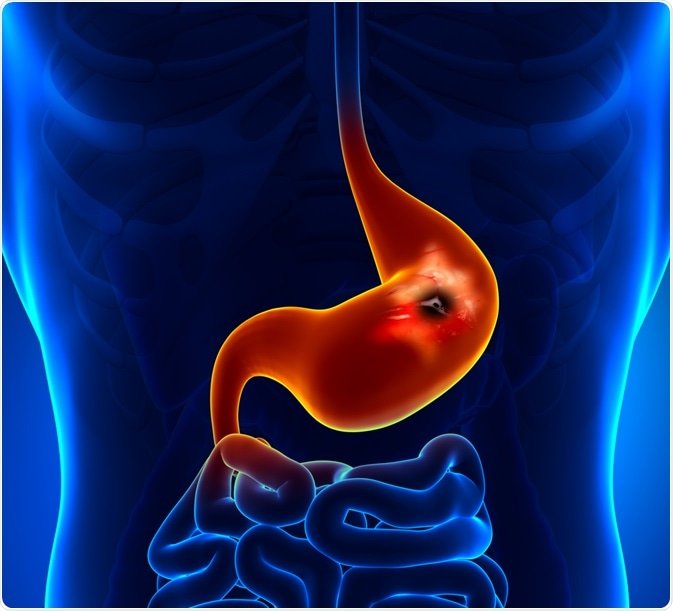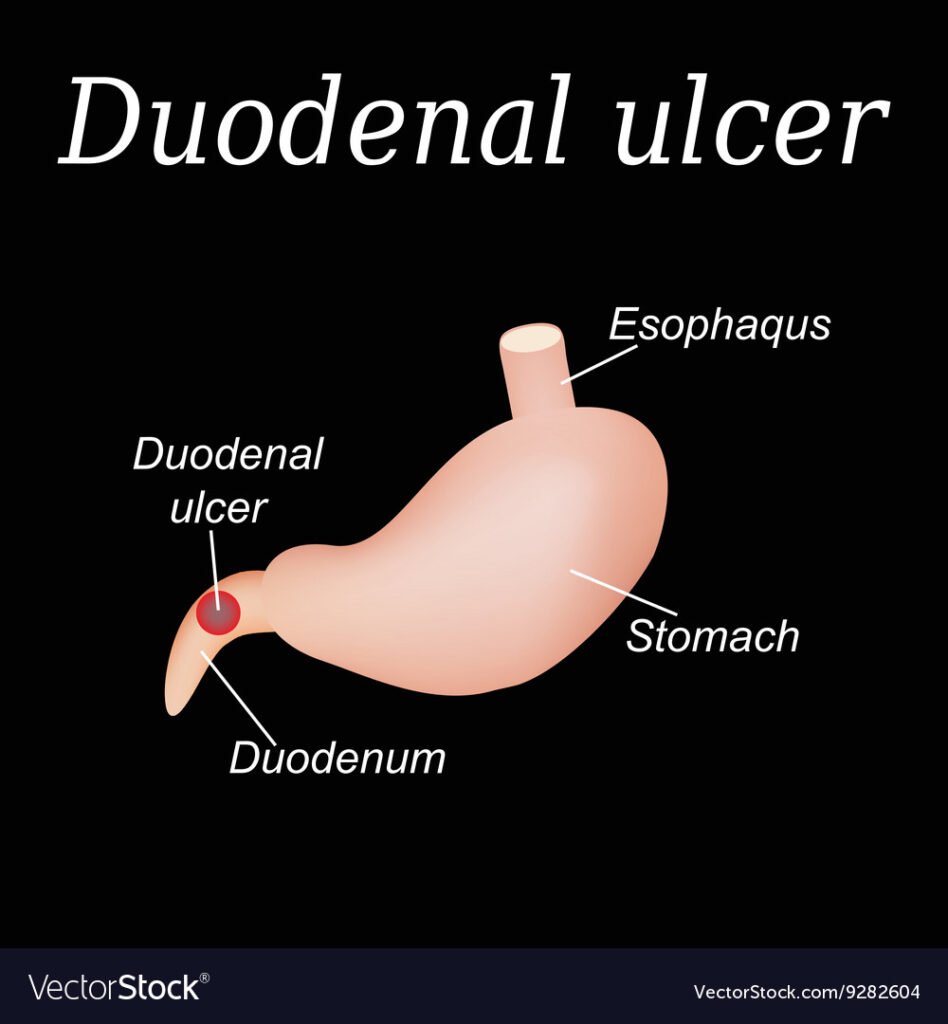A peptic ulcer is an open sore. These ulcers develop on the inside lining of the stomach and the upper portion of the small intestine. The most common symptom is stomach pain.
Peptic ulcers are broadly classified as:
- Gastric ulcers – occur on the inside of the stomach.
- Duodenal ulcers – appear on the inside of the duodenum.


Other Gastric Diseases
- How does Ulcerative Colitis affect our life and health?
- What are the reasons for causing Abdominal Pain?
- Are you aware of the different types of Gastric diseases?
- Do you know Celiac Disease is an autoimmune disorder?
- Do you know what is studied under Gastroenterology?
- Irritable Bowel Syndrome (IBS)
- What is the scope of GI Surgery or Gastrointestinal Surgery?
- Are you worried about a Peptic ulcer? Know the treatment
Consult a Gastroenterologist
- Dr. Nikhil Patil- Gastroenterologist at Fortis Hospital
- Dr. NIMISH SHAH- Gastroenterologist and Hepatobiliary Expert
- Dr. Aruna Bhave- Gastroenterologist at Fortis, Mumbai
- Dr. Satish Kulkarni-Gastroenterologist in Mumbai
- Dr. Suryaprakash Bhandari- Gastrosurgeon in Mumbai
- Dr. Rakesh Patel-Gastroenterologist at Fortis Hospital
- Dr. Gaurav Gupta- Gastrosurgeon and Abdominal Organ Transplant
- Dr. S Bhandari- Gastroenterologist in Mumbai
- Dr. Harshad Joshi- Gastroenterologist at Reliance, Mumbai
- Dr. Dimple Jain- Pediatric Gastroenterologist in Mumbai
- Dr. Chetan Kalal- Hepatology and Liver Transplant Specialist
- Dr. Chetan Bhatt- Gastroenterologist in Mumbai
- Dr. Sanjay Borude- Bariatric Surgeon in Mumbai
- Dr. Sameer Gaggar- Gastroenterologist in Mumbai
- Dr. Abhijit Thakur- Gastrosurgeon and General Surgeon
What Causes Peptic ulcer?
We know that gastric acid breaks down food for easier digestion. But, sometimes, gastric acid eats away the inner surface of the stomach or small intestine, causing peptic ulcers.
Common causes include:
- Helicobacter pylori infection– H. pylori bacteria, though not harmful, sometimes causes inflammation of the stomach’s inner layer, causing an ulcer.
- Frequent use of NSAIDs– pain relievers like ibuprofen or naproxen can irritate or inflame the lining of your stomach and small intestine.
What are the Risk factors?
There may be an increased risk of Peptic ulcer if a person:
- Smokes
- Drinks alcohol.
- Has untreated stress
- Eats spicy food
- Frequently consumes NSAIDs.
Signs and symptoms of Peptic ulcer
The most common symptom is burning abdominal pain. You feel the pain that extends from the navel to the chest.
Other common signs include:
- Nausea
- Indigestion
- Vomiting or vomiting blood.
- Change in appetite
- Unexplained weight loss.
- Bloody or dark stools.
- Chest pain
- Intolerance to fatty foods
What are the Complications?
If ulcers are not treated timely, they can become worse over a while. Ulcers can lead to other severe health complications such as:
- Internal bleeding.
- A hole (perforation) in the stomach wall.
- Obstruction.
- Gastric cancer.
- Scar tissue.
Diagnosis: How to diagnose Peptic Ulcer?
- Medical history – Check for symptoms and other risk factors.
- Physical examination – include epigastric tenderness, tachycardia, abdominal rigidity.
- Diagnostic tests – The tests performed are:
- Laboratory tests for H. pylori – blood, stool, or breath test; breath test being the most accurate.
- Upper GI endoscopy.
- Upper gastrointestinal series, i.e., barium swallow followed by X-rays of the upper digestive system.
Treatment: How is the Peptic Ulcer treated?
Surgery:
In some rare cases, a complicated stomach ulcer will require surgery. It could be:
- Tying off a bleeding artery.
- Taking tissue from the unaffected intestines and patching it over the ulcer site.
- Removing the entire ulcer part.
A Gastro-surgeon may cut off the nerve supply to the stomach to reduce gastric acid production.
Medications–
- Antibiotic medications to kill H. pylori – Amoxicillin (Amoxil), Clarithromycin (Biaxin), Metronidazole (Flagyl), Tinidazole (Tindamax), Tetracycline, and Levofloxacin.
- Proton pump inhibitors block acid production and promote ulcer healing – like, Omeprazole (Omez), Lansoprazole, Rabeprazole (Rabicip).
- H2 blockers to reduce acid production – Famotidine (Pepcid AC), Cimetidine (Tagamet HB), and Nizatidine (Axid AR).
- Antacids that neutralize stomach acid – can provide symptom relief but generally aren’t used to heal the ulcer.
- Cytoprotective agents protect the lining of the stomach and small intestine – Sucralfate (Carafate) and Misoprostol (Cytotec).
Prevention: Can we prevent it?
Prevention of Peptic Ulcer–
Lifestyle modification and habits can reduce the risk of developing Peptic ulcer; these include:
- Quit smoking.
- Avoid drinking or moderate consumption of alcoholic beverages.
- Do not mix alcohol with any medications.
- Limit the use of over-the-counter painkillers, like ibuprofen, aspirin, and naproxen.
Please wash your hands frequently as it helps to avoid infections.
Living with Peptic Ulcer–
- Most ulcers heal within about eight weeks.
- If you smoke or chew tobacco, ask the doctor about how to quit.
- Eat a well-balanced diet and avoid foods that cause discomfort like – alcohol, coffee, caffeinated soda, fatty foods, chocolate, and spicy foods.
- Avoid eating late at night.
- Talk to your doctor about the safe to use painkillers and take all medicines with plenty of water.
When to see a doctor? :
It is wise to consult with a gastroenterologist immediately if observed any symptoms. The typical consultation fee for a gastroenterologist ranges from Rs. 500 to Rs. 1500 in India.